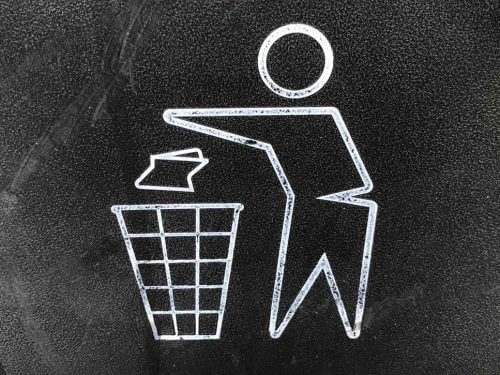The FAMAE Foundation offers a high financial reward to engineers and planners who find sustainable solutions to the problem of garbage and its impact on the environment

By Tal Cohen, Angle, Science and Environment News Agency
The French FAMAE Foundation has announced a financial prize of one million euros for those who will propose a solution in the field of reducing and managing household waste in the most environmentally friendly way. In order to reach as many visionary engineers as possible and challenge them to harness their skills for the future, the foundation's people travel around the world and present the competition. On February 1st, the foundation's staff looked for the solutions of environmentalists and technology in Israel to this problem, at an event held at the Microsoft Accelerator in Tel Aviv, as guests of the Afka Institute for Engineering and Circular Economy.
Dealing with garbage is an issue that concerns many governments and cities around the world. The world is getting more and more crowded, consumption is increasing even more and the areas for landfilling or throwing garbage are getting smaller and smaller. Avi Blau, head of the Afka Institute for Engineering and Circular Economy, illustrates this with an example from the world of fashion: "It goes under our radar, but the world throws away an entire waste truck full of textiles every second. In a year, this reaches a monstrous amount of about 40 million tons that go to waste. Why not recycle them? The main reason is that it is impossible to know what the garment is made of (cotton, polymer, other fiber) and send it to the appropriate recycling route."
According to Blau, the situation, which is becoming urgent to be addressed at the global level, is an excellent opportunity for entrepreneurship and creative engineering solutions.
Circular absurdity
Two years ago he won In an international H&M competition A team of engineers developed a fiber with RFID (electronic tagging) capability, which will contain the information on the type of materials in the garment, and will easily allow the garment to be directed to the appropriate recycling process. Textile is A product whose production harms the environment at all stages of its production and use (From the farming stage to the stage where the seller or consumer throws it into the trash can, in many cases without any use being made of it). The world of the circular economy recognizes such absurdities and asks how to connect the two ends and close the loop so that the earth's resources can be used with maximum efficiency in the future as well.
Cell phones are another example of an environmental and technological market failure that should and can be solved with engineering and planning tools. The amount of gold in discarded cellphones is 300 grams per ton - about 200 times more than the amount of gold in the material mined in a gold mine. The problem is that when the phones are collected, they have to be separated from the rest of the waste and then they have to be disassembled in a way that allows the gold to be extracted cheaply. Today, it is impossible to do this in a process that is financially profitable, for the simple reason that the phone designers were never asked to develop a phone that would be easy to extract the gold from.

In fact, before dealing with the recycling potential of smartphones, it is worth checking if something can be done even before the recycling stage. According to the concept of the circular economy, recycling is replaced by planning in advance to leave the resources in a closed system - in a model of shared use, renewal or upgrading. Today, smartphones are not designed to go through a technological upgrade procedure also because no engineering need has been defined and because there is no economic model that encourages upgrading components. The result is that a sophisticated and expensive device is thrown away after a relatively short period of use.
Just recently a company came out Fairphone The Dutch woman with her new phone, which, unlike other products on the market, can be disassembled relatively easily, so that components can be easily upgraded during its life, and fully recycled at the end. This of course requires a complex engineering plan that considers the end of the product's life cycle already in the planning phase (and even in the concept phase). The company has also developed an interesting business model that will make all this worthwhile for it.
What does Google do?
Are these esoteric examples or a move that can have a profound and effective impact on the market? In this case too, to answer the question to check whether this is a topic that concerns the world's technology giants: a recent report published by Google "How do digital solutions contribute to the environment?" There is significant engagement in the circular economy. The report presents solutions for dematerialization (using fewer materials to obtain the same level of performance from the product, for example downloading music files instead of buying a CD) and creating transparency about the product's content as tools to reduce its environmental impact.
The field of IoT (the Internet of Things), in which almost every technology giant has a hand and foot, also has a huge potential to be used as one of the solutions to the garbage problem: these tools make it possible to provide information on the location, availability, condition and composition of materials in various products. This information will enable better maintenance, which will significantly extend the duration of the product's use, will enable another stage in the product's life, for example through its intelligent transfer to be dismantled in a suitable facility. In addition, geographic information and big data together can provide information on flows of materials, components, products, and people in the city and provide insights on demand peaks (energy, transportation), waste generation centers, traffic jams, etc. Using these information tools it will be possible to plan more efficient solutions from an environmental and economic point of view to the garbage challenge.
According to Avi Blau, the recognition that this is actually a tremendous economic opportunity is permeating at a rapid pace and is driving the market for circular economy solutions. "In a survey conducted just a few years ago in Europe, it turned out that the average European buys 800 kilograms of food and drinks, 120 kilograms of packaging, and 20 kilograms of shoes and clothes every year," he says. "80 percent of the financial value of these products goes down the drain because most of the time they are simply sent to a landfill or burned, this does not make sense and is going to change in the coming years with the help of technological developments and the allocation of resources to the issue."

7 תגובות
All the comments before explain exactly the problem. Someone else is to blame for all of them. It could be the manufacturers, the legislators, the officials, the lobbyists.
Friends!!! Nothing will change until we all reduce consumption. As long as people continue to buy to throw away, and as long as the world's population continues to grow, all the proposed changes are only decoration. They will improve the efficiency of the consumer culture, and allow more people to keep buying and throwing away, but there will be no trend.
Those who sell us IOT want us to throw away the product without and buy one with. Even those who integrated an upgrade option in the phone, do not know what upgrades will be required in a decade. That's why their whole goal is for us to throw away our non-upgradable device and buy an upgradeable one that we'll throw away in XX years because it will no longer meet the requirements.
The biggest setback in the whole story is that in the developed countries people can be convinced to reduce consumption, and the reduction of births is inherent in the increase in the standard of living. But most of the world's population is on the other side, where consumption is just beginning to develop, and the improvement of the medical system (with the generous assistance of the developed) leads to a population explosion. These of course lead to an uncontrolled increase in consumption and the generation of waste that floods the world.
Products should be taxed at the production stage according to their garbage signature. This is the only way we will stop seeing the big clickers that come with white electrical appliances "so that there are no scratches".
I agree with Ahad Ha'am. The point is that it is much cheaper and more profitable to bribe
(Or "finance an election campaign" as it is called in democratic countries..)
Than to change complex production processes in production lines. That's why you need to act
For the sake of increasing awareness in the rich countries where recycling is a part
the agenda That's also where the big garbage piles are - at least in a way
Relative to the number of inhabitants, when the public in these countries will demand a solution
He will eventually be found and become an example for the rest of the world to follow.
As in the process of removing the lead from the fuel, the same will happen in the recycling business.
One of the main problems in regulation, as suggested by Benjamin, is capital-government relations. The higher the influence of those with vested interests (see the phenomenon of lobbyists in the Knesset, when in my personal estimation, this is only the tip of the iceberg) it is difficult for legislators who have a conscience and public responsibility left to act.
Who does not know the painfully true story about GMC's (successful) attempts
in part) to continue to poison the world for decades with a lead additive
For Delek, I don't understand how the public good doesn't bother the heads of the industry at all.
As with the cars, it's all about regulation.
Just like adding the catalytic converter to cars, it is quite simple to enact a law to solve the problem of identifying the ingredients of clothes. When large manufacturers will not be able to market clothes without a suitable electronic tag in developed countries - they will already make the effort...
If you want to get the gold out of cell phones, you just have to burn them and extract energy from the organic matter. Things are relatively simple - all that is missing is the awareness and energy to fight against manufacturers who would prefer not to spend the money on the road (precisely because of the additional expenditure and the discourse surrounding it) and to raise awareness of the filth that is left behind
Their products...people may still come to the conclusion that if this product is a waste of money.
Important and interesting
Just Q: Why is there a need for a main title in addition:
"………………you are crap….." ?
Manure is an organic and positive product that is used for fertilization/fertilization in agriculture,
It is appropriate that the writers (and the editor) learn and internalize the difference
Between: garbage or waste to garbage...